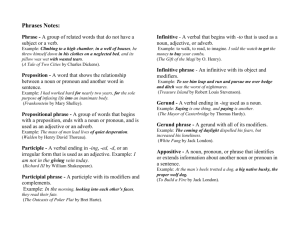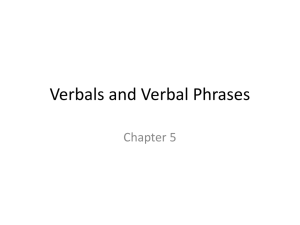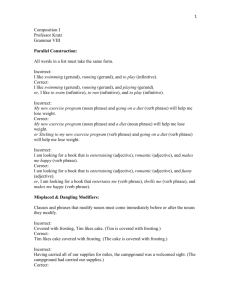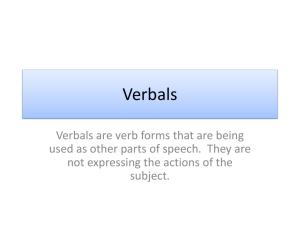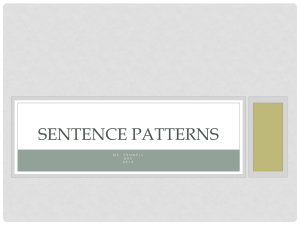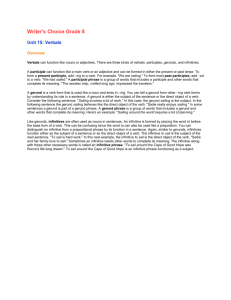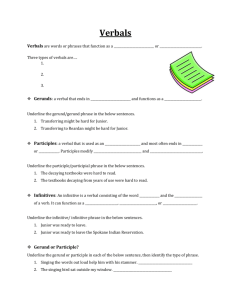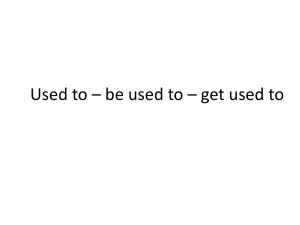DGP TUESDAY NOTES (Sentence Parts and Phrases) continued
advertisement
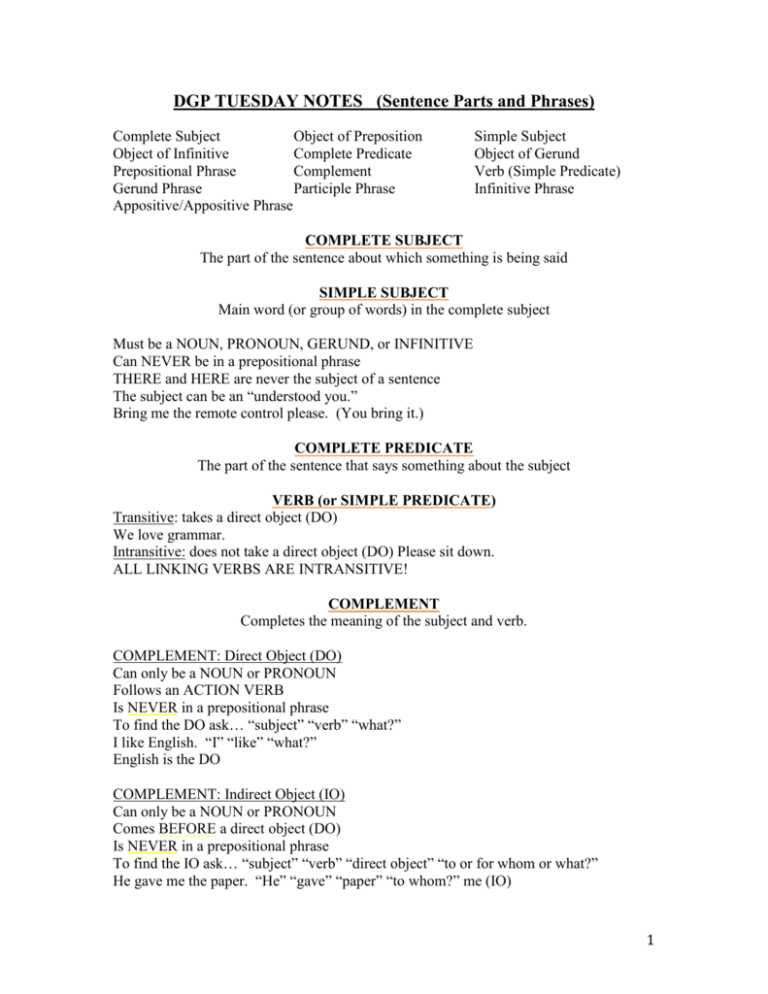
DGP TUESDAY NOTES (Sentence Parts and Phrases) Complete Subject Object of Preposition Object of Infinitive Complete Predicate Prepositional Phrase Complement Gerund Phrase Participle Phrase Appositive/Appositive Phrase Simple Subject Object of Gerund Verb (Simple Predicate) Infinitive Phrase COMPLETE SUBJECT The part of the sentence about which something is being said SIMPLE SUBJECT Main word (or group of words) in the complete subject Must be a NOUN, PRONOUN, GERUND, or INFINITIVE Can NEVER be in a prepositional phrase THERE and HERE are never the subject of a sentence The subject can be an “understood you.” Bring me the remote control please. (You bring it.) COMPLETE PREDICATE The part of the sentence that says something about the subject VERB (or SIMPLE PREDICATE) Transitive: takes a direct object (DO) We love grammar. Intransitive: does not take a direct object (DO) Please sit down. ALL LINKING VERBS ARE INTRANSITIVE! COMPLEMENT Completes the meaning of the subject and verb. COMPLEMENT: Direct Object (DO) Can only be a NOUN or PRONOUN Follows an ACTION VERB Is NEVER in a prepositional phrase To find the DO ask… “subject” “verb” “what?” I like English. “I” “like” “what?” English is the DO COMPLEMENT: Indirect Object (IO) Can only be a NOUN or PRONOUN Comes BEFORE a direct object (DO) Is NEVER in a prepositional phrase To find the IO ask… “subject” “verb” “direct object” “to or for whom or what?” He gave me the paper. “He” “gave” “paper” “to whom?” me (IO) 1 DGP TUESDAY NOTES (Sentence Parts and Phrases) continued COMPLEMENT: Predicate Nominative Can only be a NOUN or PRONOUN Follows LINKING VERB and renames the subject. To find it ask… “subject” “linking verb” “what?” He is a nice guy. “He” “is” “what?” guy (predicate nominative) COMPLEMENT: Predicate Adjective Is an ADJECTIVE (DUH!!!!) Follows LINKING VERB and describes subject To find it ask… “subject” “linking verb” “what?” He is a nice guy. “He” “is” “what?” nice (predicate adjective) APPOSITIVE/APPOSITIVE PHRASE Noun or pronoun that follows and renames another noun or pronoun Appositives are usually offset with commas, brackets, or dashes. Don't leave your shoes there, or my dog, Ollie, will munch them. (In this example, the appositive is Ollie. It is in apposition (as it's called) to my dog.) Tammy, my daughter, loves to read. OBJECT OF THE PREPOSITION Follows the preposition and tells “what?” The bug is under the rug. If there is NO object, it is NOT a preposition: Please stand up. (Up is an adverb) OBJECT OF THE INFINITIVE Follows the infinitive and tells “what?” I want to eat fish. “to eat what?” Fish is the object of the infinitive. OBJECT OF THE GERUND Follows the gerund and tells “what?” I like eating fish. “eating what?” Fish is the object of the gerund. 2 DGP TUESDAY NOTES (Sentence Parts and Phrases) continued PREPOSITIONAL PHRASE It is a group of words…BEGINNING with a PREPOSITION and ENDING with a NOUN or PRONOUN. Adjective: I want a room with a view. Adverb: His house is on the lake. GERUND PHRASE It is the gerund plus its modifiers and objects. Remember…Gerunds are verbs that act like a noun and end in “-ing” Eating blackberries without washing them will make you ill. In the gerund phrase above: Eating is the gerund. (A gerund phrase always starts with the gerund.) The word blackberries is the object of the gerund. (The object of a gerund is also called the gerund complement.) The phrase without washing them is a modifier. Writing long essays can be fun. PARTICIPLE PHRASE A participle phrase is an adjective phrase that starts with a participle. It is the participle plus its modifiers and objects. Remember… Participles are verbs that act like an adjective and end in “-ing” or “-ed” You could see the panther releasing its grip. (The participle phrase is describing the panther.) Running down the hall, he bumped into the principal. INFINITIVE PHRASE It is the infinitive plus its modifiers and objects. Remember… Infinitive is to + verb and can act like a noun. He likes to knead the dough slowly. (The infinitive verb is to knead. The complement is its direct object (the dough). The modifier is the adverb (slowly). They all make up the infinitive phrase. He likes to eat pepperoni pizza. 3
